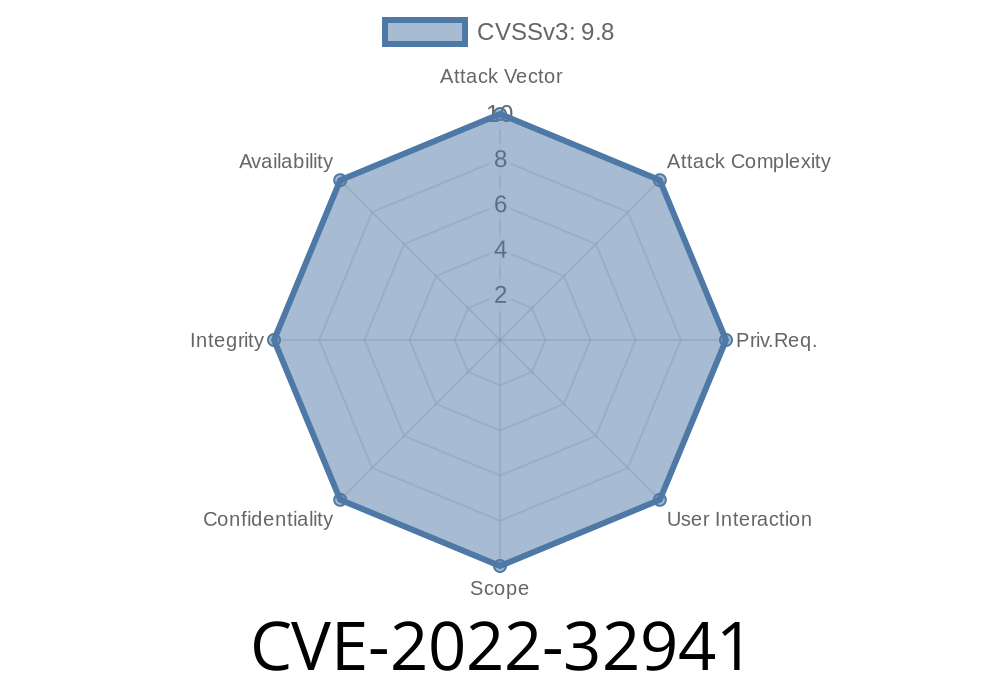---
Introduction
In 2022, Apple patched a critical security vulnerability tracked as CVE-2022-32941. This bug addressed a buffer overflow in the kernel that could let an attacker execute arbitrary code with system privileges on affected devices. This article explains what CVE-2022-32941 is, how it works, and shows code-level insights, plus ways it can be exploited for educational and defensive purposes. If you own any Apple device, it’s essential to know why patching is a must against this threat.
What is CVE-2022-32941?
At its heart, CVE-2022-32941 refers to a buffer overflow issue in an Apple kernel component. Before this bug was fixed, attackers could send crafted input to overflow a memory buffer owned by the operating system, potentially hijacking control for arbitrary code execution—that means running their own code, which could include malware, spyware, or privilege escalation exploits.
Big Sur 11 before 11.7.1 (fixed in 11.7.1)
Source Reference:
- Apple Security Update iOS 15.7.1, iPadOS 15.7.1
- Apple Security Update macOS Monterey 12.6.1
What is a Buffer Overflow?
A buffer overflow happens when a software tries to store more data in a buffer (a temporary memory storage space) than it was designed to hold. If proper checks aren’t performed, data can spill over into adjacent memory, corrupting data, crashing programs, or even allowing attackers to inject and execute malicious code.
In this case, the Apple kernel component failed to check buffer boundaries properly, allowing an overflow.
The Technical Side: Example Breakdown
Disclaimer: The following is an example illustration for educational purposes only. Exploit attempts on devices you don’t own is illegal.
Suppose the vulnerable Apple kernel function looks something like this (example written in C style for simplicity):
void process_input(char *user_data, unsigned int length) {
char buffer[128];
// Vulnerable: No length check!
memcpy(buffer, user_data, length);
}
What Went Wrong?
Here, if an attacker supplies more than 128 bytes to user_data and sets length accordingly, the function will copy more bytes into buffer, causing whatever lies after buffer in memory to be overwritten—including, potentially, the function’s return address.
Overwrites the return address with the shellcode’s location
When the function finishes, the processor “returns” not to the original location, but jumps to the attacker’s code.
Sample Exploit Snippet (Pseudo-Code)
payload = b"A" * 128 # Fill buffer
payload += b"\x90" * 16 # NOP Sled (safe landing pads)
payload += malicious_shellcode # Attacker's code
payload += struct.pack("<Q", address) # Overwrite return address
# Send payload to vulnerable function (e.g., via IPC or USB interface)
send_to_victim(payload)
*Note that the real exploit would be more complex and device-specific, considering ASLR, stack canaries, and other mitigations!*
How Did Apple Fix It?
The Apple team fixed CVE-2022-32941 by adding proper bounds checking before copying data. This is often done with something like:
if (length > sizeof(buffer)) {
// Reject input or truncate safely
return ERROR;
}
memcpy(buffer, user_data, length);
This simple check makes sure that no one can supply more data than what can safely fit in the buffer—blocking the overflow.
Exploitation Impact
A successful exploit could grant the attacker kernel-level code execution, effectively giving full control over the device. That could mean:
Hiding malicious files from the user
Given this is a kernel bug, no regular app or userland sandbox protections would help once exploited.
Official References
- Apple Security Bulletin for CVE-2022-32941
- NIST NVD CVE-2022-32941
Conclusion
CVE-2022-32941 stands as a reminder that even mature, widely-used codes like those powering Apple’s devices can have critical flaws. Update your Apple devices to the latest OS as soon as possible! If you’re building or maintaining software, always add proper bounds checking to buffer operations—you never know when a small omission can turn into a big vulnerability.
Stay safe, and keep your software updated!
Further Reading:
- A Simple Explainer on Buffer Overflows (owasp.org)
- The Art of Exploitation - Buffer Overflow Attacks (Hacksplaining)
Timeline
Published on: 11/01/2022 20:15:00 UTC
Last modified on: 01/09/2023 16:44:00 UTC
